
THE
VETERANS WORK
BOOK
How to Transition
Out of the
Military and
GET HIRED!
KEVIN LACZ
BILL HOBBS &
LINDSEY LACZ
The La Plata Press
La Plata, MD
This book, or parts thereof, offers suggestions believed to be helpful and useful based upon the authors experience and research. Nothing in this book should be considered to be an absolute statement about a specific course of action to be taken in any particular circumstance, as numerous factors must be considered. This book is not intended to offer any legal advice or counsel, and to the extent that any legal issues are referenced in this book, it is not intended to be a substitute for professional legal representation.
Copyright 2019 by Bill Hobbs
All rights reserved. This book and parts
thereof, may not be reproduced in any form
without written permission.
ISBN: 978-0-9858456-7-4
e-book: 978-0-9858456-8-1
For More Information About
The WORK Book
Books, Learning Materials, and Lecture Series
www.theworkbookseries.com
Executive Editor Charles Hobbs
W HEN I FIRST READ The WORK Book two-years ago, I immediately realized there was a need for a similar book for veterans transitioning out of the military. As a speaker, I regularly meet veterans who ask, How were you able to make the transition from Navy SEAL to Physician Assistant? They are impressed, not just that I went back to school and found a new career, but that Im well-adjusted to life in the civilian world. The more veterans I meet, the more I realize the need for a discussion about how to make that seamless transition from active duty service member to life after the military.
Bill Hobbss first version of The WORK Book was wildly successful and provides a valuable asset to students entering the job force for the first time. For the Veteran Edition, we teamed up with the aim of repurposing some of his material specifically for service members transitioning out of the military and into a new career. Although everyone undergoes the DoDs mandatory TAP course before separation, we feel there is more we can provide to veterans venturing out on their post-military journey.
It is my opinion that veterans with military experience are valuable assets in the business world because they have experience leading, being led, and performing under pressure. However, its necessary for veterans to learn how to function in their new environment. Just as I meet many veterans who ask how they can use their military experience to their advantage, I regularly meet civilians who ask how they can better relate to veterans. Increasingly, I meet employers who ask what they can do to accommodate veterans in the workplace because often there is a disconnect between veterans and civilians. Its well-documented that veterans often feel they dont relate well to civilians and that civilians often dont understand veterans. I ask veterans to assume some responsibility for rectifying this situation. As a group, they should remember that military service neither automatically guarantees or disqualifies a candidate for a particular position. A veteran should be a highly adaptable human being and should be able to function in the same work environment as his/her peers without requiring special accommodations. A persons time in the service should make him/her more employable, not hinder an employers ability to hire that person. In order for that to be true, veterans must learn how to brand their experiences and assimilate into civilian life. My views may vary wildly from many others, but I attribute much of my post-military success to my willingness to become a civilian. You may find a bit of tough love sprinkled throughout the pages of this WORK Book, but I encourage you to respect your time in the military for what it was, to look back on it fondly, provided it was a positive experience for you, and begin your journey into the civilian world with a clean slate and an open mind.
CONTENTS
I EMBARKED ON A twisted path toward a career as a medical provider in the fall of 2000. As a freshman at James Madison University, I enrolled in the necessary pre-med courses and imagined I was preparing myself to become a doctor. By then end of my freshmen year, I found I had spent more time in the Rugby House basement than in the classroom and that I had not made great academic progress toward graduation.
With the fall of 2001, came a watershed moment in my 20-year-old life. My close friends father was killed in the South Tower of the World Trade Center on September 11, 2001. At that point, I had a desire to do something bigger and more important with my life. I was able-bodied and angry about the terrorist attacks, so I joined the Navy. I wanted to see combat.
After 8 years in the military, during which I did two combat deployments to Iraq as a Navy SEAL, I felt like I fulfilled my obligation to my country. I still had a deep-seated desire to practice medicine, and as an 18D medic, Id been able to at least begin down that path in the military. I believed it was time for me to rejoin the civilian world and embark on a second career.
I was fortunate to be able to make the transition from the military to UCONN, to graduate school, and finally, to the workforce. Thats not to say it was easy, but I knew I had the skills to make it happen. I meet and speak to veterans all the time who ask how they can do the same thing. How can they leave the service and go to college as non-traditional students? How can they find jobs in the private sector? With this work book, I take a holistic approach to realistically prepare veterans for the difficulties of the hiring process by empowering them to utilize all of their available resources. While the Transition Assistance Program has certainly become more robust since I left Active Duty in 2008, this workbook takes an extra step towards addressing veterans current and future transitional needs in terms of personal branding, acclimating to civilian life, and entering the job market. Since professional growth and building a personal brand are continuous processes, this book also helps veterans grow after they find a new career. The Veterans WORK Book addresses all of these needs and is short enough that veterans can read it quickly and apply it immediately.
M ANY RESOURCES EXIST TO aid in the transition from active duty service member to member of the civilian community. As you prepare to complete your time of service, you will attend Transition Assistance Program (TAP) courses. Your TAP manual, the staff at the Military Services transition office, and the staff you are assigned to at the VA center are valuable resources you should be prepared to take advantage of. If you are a recently separated veteran, the same resources will be useful to you as you adjust to your new life. Attending TAPs may feel like just another mandatory training the military sends you through or the last stop before you are released from Active Duty, but consider it the bare minimum amount of preparation you should do before going out into the civilian workforce. If you want to get ahead, you should take advantage of every opportunity afforded to you, and that includes TAPs.
Although the DoD and the VA have provided you with some resources, in The WORK Book we take a holistic approach to your new life in the civilian labor force. One important aspect of this transition is your personal brand. Think of your personal brand as simply a reflection of the way you are viewed by others in the market. Right now, several of your peers in the military possess many of the same skills and qualifications as you. As you enter the private sector, however, you will find that those same skills and experiences make you distinct and separate you from others without military experience who are competing for the same job. Successful transition involves utilizing the valuable components of your past in order to sell your personal brand to prospective employers in the civilian world.
Next page
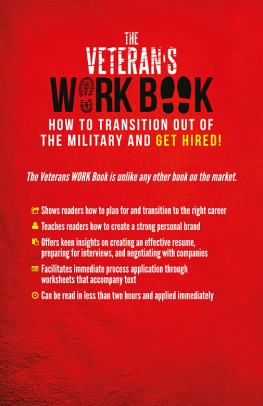
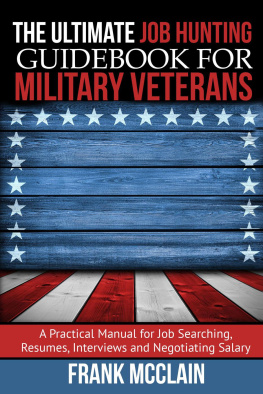
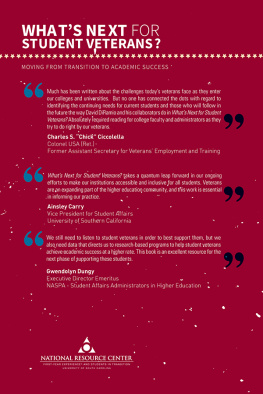

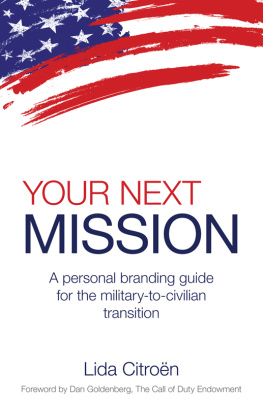
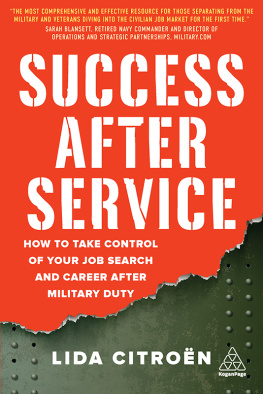
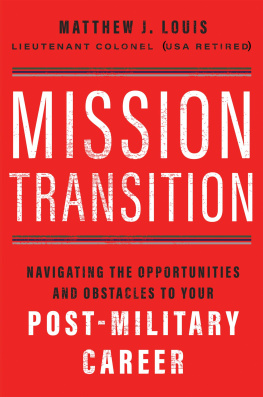
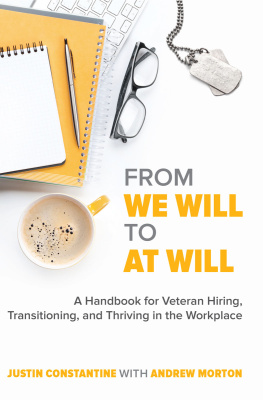
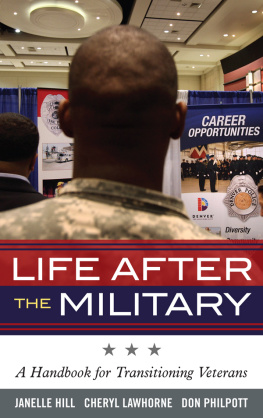
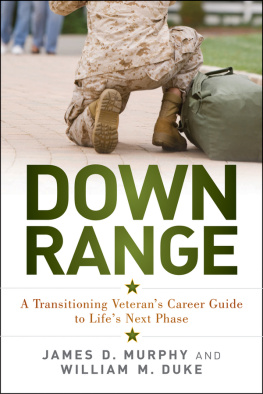
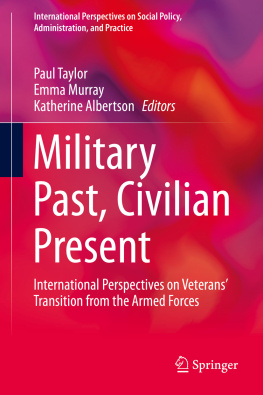
![Louis Hicks - The Civilian Lives of U.S. Veterans: Issues and Identities [2 volumes]](/uploads/posts/book/133676/thumbs/louis-hicks-the-civilian-lives-of-u-s-veterans.jpg)
